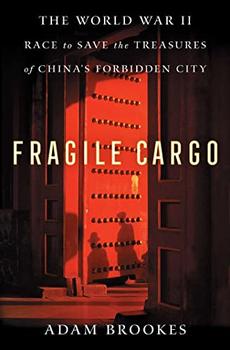Summary | Excerpt | Reviews | Beyond the Book | Readalikes | Genres & Themes | Author Bio

The World War II Race to Save the Treasures of China's Forbidden City
by Adam BrookesPrelude
THE FORBIDDEN CITY
Peking, January 28, 1765
We begin in a silvered winter darkness, the air tingling with frost. Mounds of old, hard snow fill the imperial courtyards. Great, glistening icicles hang from the eaves of the palaces. The lakes are frozen over. The Forbidden City lies behind its towering, protective walls of ocher red. The halls and temples, gardens and alleyways wait, silent, suspended in night.
At 4 a.m., a sign. Light from a candle flickers in the Hall of Mental Cultivation. The emperor of the Qing, whose vast territories we today call China, is awake. The palaces stir. Imperial eunuchs—men castrated when boys—in long, silken gowns run to their posts, their reedy cries echoing through the halls: Wansuiye jixiang! Great fortune to His Majesty! Eunuchs rush from the kitchens to the emperor's sleeping quarters bearing a pail of hot water. The emperor descends from his kang, the raised, heated bed, and chambermaids bustle in to tidy his quilts. The emperor washes. A eunuch brings shaving tools wrapped in silk of imperial yellow, and shaves the emperor's face, chin, and the front half of his scalp. The eunuch brushes out the emperor's hair and weaves it into a long braid in the Manchu style.
The emperor dresses himself. On this day he puts on a gown of yellow silk, thick white silken trousers, and socks of white velvet. Around his shoulders he drapes a cape trimmed with sable fur. At his waist he fastens a belt of emeralds and pearls. He wears black boots lined with wool and a fur cap of sable. Outside, in the predawn darkness, a heated litter waits to carry him through the courtyards. Eunuchs bear him across the icy flagstones, breath steaming in the cold air as their tiny, lantern-lit convoy creeps beneath the looming palaces. These palaces have been the seat of emperors since their construction by a million conscripted laborers in the early fifteenth century. The wider imperial precincts are home to government and bureaucracy, but this, the Forbidden City, is the red-walled inner sanctum of the empire, a sacred core where none but the emperor's household may live and move freely.
The emperor has many names. His family name is Aisin Gioro Hongli, which tells of his ancestry among the Tungusic tribes that dwelled in the wintry mountains and steppe of the region known as Manchuria, far to the northeast. Aisin Gioro Hongli's forebears unified the tribes politically and militarily, under a common identity: the Manchus. In the seventeenth century, as the Ming empire ailed, the Manchus swept south and proclaimed a new ruling dynasty, the Qing. Qing armies, led by Manchu generals, took Peking in 1644. Over the decades, the Qing has come to dominate a huge tract of Asia, from tropical southern seas through the Chinese-speaking heartland to the Tibetan highlands and the great central Asian deserts, a mighty conglomeration of geography, ethnicity, languages, and cultures.
Aisin Gioro Hongli, more commonly known by his reign name, Qianlong, is the sixth emperor of the Qing. As he sits in his heated litter on that winter morning in 1765, Qianlong is ending the third decade of his reign. He is fifty-three years old, a tall man whose portraits suggest fine features, perhaps a prominent nose, a strong chin. He reigns in a period of nascent industrialization and globalization. In Britain James Watt is designing the steam engine. The young prodigy Mozart is performing across Europe. Louis XV is at Versailles. In America colonists are violently resisting taxation by the British crown. Japan is closed and isolated.
The eunuchs bearing Qianlong's litter set him down at the Palace of Earthly Tranquillity. It is still dark. Inside, shamans conduct the rites of the morning, secret ceremonies presided over by women, conducted in the Manchu language according to Manchu tradition, accessible only to those of Manchu ancestry. A part of the palace serves as a kitchen to cook great slabs of meat as offerings to the Manchu deities. Qianlong communes with his ancestors for an hour. The air is filled with ritual music, smoke, and the smell of boiled pork.
Excerpted from Fragile Cargo by Adam Brookes. Copyright © 2023 by Adam Brookes. Excerpted by permission of Atria Books. All rights reserved. No part of this excerpt may be reproduced or reprinted without permission in writing from the publisher.




Courage - a perfect sensibility of the measure of danger, and a mental willingness to endure it.
Click Here to find out who said this, as well as discovering other famous literary quotes!
Your guide toexceptional books
BookBrowse seeks out and recommends the best in contemporary fiction and nonfiction—books that not only engage and entertain but also deepen our understanding of ourselves and the world around us.